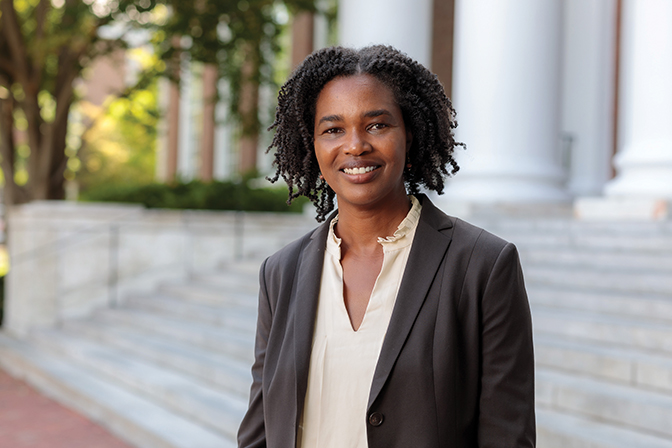Raised in the Commonwealth of Dominica, a small island in the Caribbean, Kisha Lashley, Ph.D. ’02 faced significant financial constraints when it was time to explore her options for college. Her search ultimately led her to Berea College in the late 1990s. With nothing to lose, she boarded a flight to Michigan and settled in for the long drive to campus with her cousin.
Though she intended to major in chemistry, she reviewed the course catalog and realized that Berea’s curriculum covered much of the same material she studied in her advanced classes in Dominica. So, she chose another path that seemed interesting: technology and industrial arts. Early in her undergraduate career, she was asked to join a pilot program intended to determine whether it was feasible for Berea students to build the laptops that would be provided to all students.
While at Berea, Lashley had several summer internships at a manufacturing company in northern Kentucky, a popular career choice among her colleagues in the Technology and Industrial Arts program. Though she found the work enjoyable, she quickly decided it wasn’t the right path for her. After graduating, she went on to pursue a master’s degree at Vanderbilt University, which prepared her for a job in technology transfer at Emory University, but again, Lashley didn’t feel that this was the right fit.
She decided to enroll in graduate school once again. When she found herself in need of a dissertation topic, she turned her attention to the rising number of flourishing businesses in the marijuana industry. She noted, too, that these businesses often are owned by white, college-educated men. “Coming from the Caribbean, everything I knew about marijuana was stigmatized. Where I grew up, people went to prison for marijuana,” she explained. “I wanted to understand why people who seem to have other options would take that path.”
Berea was life-altering for me in so many positive ways. I think it changed the trajectory of my life.
Kisha Lashley ’02
In her search for answers, however, she found that her initial interest in the industry had changed.
“People in the U.S. weren’t even thinking about that—they were thinking about how to change perceptions,” she said. Fast forward to her current position at the University of Virginia (UVa), Lashley is now a qualitative researcher who studies contentious practices in organizations and examines stigma, reputation and status. She admits that finding her way in her career has been a “windy path,” but she finally found the perfect mix of teaching and research.
Lashley earned a degree in technology management from Vanderbilt University, and a degree in business administration from Pennsylvania State University. A former teacher of strategic management at McIntire, she was promoted to associate professor at the UVa School of Commerce and held a one-year faculty appointment at the Harvard School of Business. Prior to her career in academia, she worked for several years examining relationships between corporations and their small suppliers. She eventually began to find her role unfulfilling.
“I didn’t feel like I was achieving the type of impact I wanted,” she explained.
Determined to ask questions other people weren’t asking, Dr. Lashley felt her unique background and experiences added a different dimension to the field.
Now a Shannon Center Mid-Career Fellow at UVa’s medical school, in honor of her significant contributions to the school, Lashley is dedicated to understanding how organizations on the margins are able to survive and thrive. “A lot of the work I do takes a look at organizations and their stakeholders and how they try to manage perceptions,” she explained. “How can an entire industry change perceptions and get rid of the stigma? How does an organization build its reputation and status?” She also examines how organizations impact the marginalized populations that work for them.
While Lashley’s path had some twists and turns, she considers Berea College to have been an important first step along her journey.
“Berea was life-altering for me in so many positive ways,” she said. “I think it changed the trajectory of my life.”
She believes in the Berea mission so much that she has begun mentoring current Berea College students as a way to “pay it forward.” During these conversations, she asks questions and offers guidance as they explore career options.
“I feel like I have made a lot of decisions in the past 20 years—I’ve made a lot of mistakes, and I’ve also made a lot of good decisions, and I have a better grasp of the questions I should be asking to prompt students to figure out what they want to do next,” she said, adding that she hopes the students she meets find their conversations fruitful.
To the wider Berea audience, the researcher shares a final takeaway message: “The evidence is there that Berea makes a difference to the people who walk through those doors,” she said. “I don’t know to what extent the Berea model can be replicated, but it’s a model that should be preserved at all costs.”


